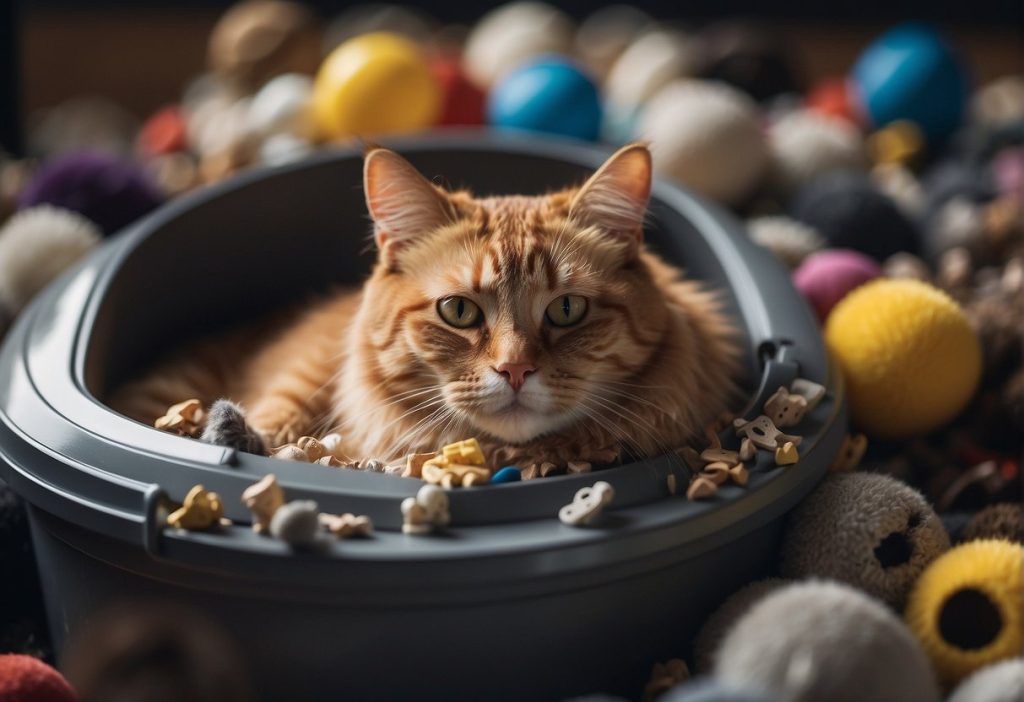Have you ever caught your furry companion curled up in their litter box and thought, “Why is my cat sleeping in the litter box?” This peculiar behavior often leaves cat owners puzzled and concerned.
After all, the litter box is meant for a very different purpose, and seeing your adult cat use it as a cozy nap spot can be quite perplexing.
Feline sleeping habits are a window into their comfort and health, so unusual patterns like choosing a litter box for a snooze are worth exploring.
If you’re trying to unravel the mystery behind why your feline friend prefers the litter box over their comfy bed, it’s crucial to delve into the underlying reasons to effectively address and resolve this curious behavior.
The intention here is to unravel the mystery behind your cat’s litter box lounging.
Whether your kitty is dealing with a medical issue, feeling stressed or insecure, or simply trying to make a statement, this behavior should not be overlooked.
We’ll explore the various health-related and environmental factors that may lead your cat to this unusual choice of a resting spot, including the cleanliness of their litter tray.
However, it’s important to note that lying in the litter box can also be a sign of illness.

As a cat owner, it’s important to pay attention to other signs of illness or behavioral issues, such as inappropriate urination, vocalizing while urinating, lower appetite, or lethargy, and seek veterinary care and advice if necessary.
Recognizing these signs of illness is crucial for the overall well-being of your furry family member.
Key Takeaways
- A cat sleeping in the litter box could signal health or behavioral concerns.
- Identifying the cause is crucial for the cat’s well-being and comfort.
- Practical solutions and understanding can correct this behavior.
Why Is My Cat Sleeping In the Litter Box?
While your cat might choose a variety of odd places to nap, generally, their litter box isn’t one of them.
So, is this behavior a cause for a pause? Veterinary surveys indicate that only a small percentage of cats choose to rest in their litter box, and it’s often a signal that something may be off.
Recognizing Concerning Signs:
- Spending prolonged periods in the litter box
- Showing signs of discomfort, such as straining or excessive licking (1)
- A sudden shift from their usual preferred snoozing spots to the litter box
Consider This:
A cat owner noticed their usually playful kitty spending more time in the litter box than on the sunny window sill. This behavior, alongside changes in bathroom habits, prompted a vet visit.
Turns out, it was a urinary tract issue, quickly addressed with professional help.
Keep a keen eye out for:
- Changes in the volume or color of your cat’s waste
- Unusual odors or stains in their litter box
Remember, these could be vital clues pointing toward your cat’s well-being. Trust your instincts; if something seems off, it’s better to explore it further with your vet.
After all, wouldn’t you do the same for any other member of your family?
Medical Causes Behind the Behavior
It genuinely might be more than just a quirky habit. Let’s explore some medical reasons for this unusual choice of a napping spot.
Urinary Tract Infections (UTIs) often top the list of medical causes behind cats sleeping in their litter box.
If your cat is spending a lot of time in their litter box, perhaps even dozing off, it might signal discomfort or pain associated with a UTI, bladder stones, or other urinary problems, which are some of the most common reasons why cats sleep in their litter box. (2)
“Cats with UTIs tend to feel an urgent need to relieve themselves frequently,” notes Dr. Whiskerson, a notable veterinarian.
UTIs can shake up your cat’s routine, causing them to spend more time in the litter box and potentially leading to symptoms such as constipation or diarrhea.
Additionally, bladder stones can also drive cats to lie in their litter box, making it one of the most common reasons for this behavior.
It’s important to consult with a veterinarian if you suspect your cat may be suffering from these issues, including diarrhea and potential blockages in their digestive tract.
Symptoms to watch for:
- Increased frequency of urination
- Meowing or displaying signs of pain while using the box
- Blood in their urine
Alongside UTIs, kidney issues can also trigger this behavior. Chronic kidney disease (CKD) is prevalent in aging cats, marked by kidney function gradually diminishing. (3)
Early signs mirror those of UTIs, but with CKD, weight loss and decreased appetite can also join the fray.
When arthritis comes into play, your cat might find the soft litter comforting for their aching joints.
“If your kitty is older, conditions like arthritis might make the litter box an attractive resting area due to the ease of access and softness,” Dr. Whiskerson adds.
Now, when should you dial up your vet? Here’s your handy checklist:
- Persistent litter box naps
- Signs of pain or discomfort
- Changes in litter box habits
Keep a log of these odd sleeping spots and any accompanying symptoms. Detail the duration, frequency, and anything else out of the ordinary to present to your vet. It’ll help them piece together the puzzle!
Maintaining that tail-waggling, purring friendship involves being alert. Remember, your whiskered pal’s health might just be the secret behind their litter box lounge sessions.
Keeping tabs on these subtle signs is your best bet for ensuring their well-being.
Behavioral and Environmental Factors
Ever wondered what’s up when your whiskered roommate decides to bunk in their bathroom? Well, let’s scratch the surface!
Cats, much like us, can experience the jitters with life’s changes, and your home is their universe.
Stress and Anxiety in Cats
Have you recently moved, or added a new furry family member? These could send your cat’s stress levels climbing faster than they scale the living room curtains. (4)
A cat that once lived in a one-bedroom apartment may find a large house overwhelming, and their litter box feels like a safe den.
Remember Whiskers? When his family moved to a new city, he spent days in his litter box, seeking comfort in his cat’s scent.
His human realized a comforting routine and familiar toys made Whispers return to his usual napping spots. In the meantime, you can try to put blankets with your cat’s scent nearby to offer a competing safe space.
This will help your cat feel more at home and reduce their stress levels caused by possible sources of stress in their environment, such as changes in their living situation or the addition of new pets.
Another factor that can contribute to your cat’s stress levels is a sudden change in their litter.
To avoid this issue, make any litter changes gradually by mixing in just 1/4 of your new litter, then gradually increasing that new litter while reducing the amount of old litter in the box.
This will give your cat time to adjust to the new litter and associate it with the place to do their business, instead of doing their sleeping.
Remember, a gradual transition to new litter is key to keeping your cat happy and comfortable.
Territorial Behavior and Safety
Consider the dynamics if you’re running a multi-cat operation. Just like siblings vying for the front seat, cats can compete for prime real estate. (5)
One may choose the litter box as their fort if they’re being out-muscled at the food bowl.
Case study: The Muffin Melodrama Muffin and Cupcake lived in pastry bliss until Muffin started hogging the litter box. A clear sign she felt squeezed out.
Adding a second litter box with some strategic placement gave them each a claim to a throne, and peace was restored.
So, what you’re seeing might not be laziness or a new quirky habit; it could simply be your kitty’s way of dealing with life’s curveballs.
Check if they’re feeling safe and secure, and you just might solve the mystery of the litter-lounging feline.
Keep the mood light, remember to chuckle at the cat-antics, and above all, keep your eyes peeled for the little signals your furry boss is sending you.
Preventive Measures and Practical Solutions
Creating a cat-friendly environment is vital to preventing your fur baby from opting for a nap in their litter box! Start by asking yourself, “Is my home a kitty paradise?”
Providing Multiple Litter Boxes and Quiet Resting Areas:
- Have you got enough litter boxes? The golden rule is one box per cat, plus one extra.
- Make sure each box is in a calm, low-traffic area, because who likes an audience when doing private business?
Tips for Maintaining a Stress-Free Environment for Cats:
- Is your home the epitome of zen for your cat? Keep things mellow with pheromone diffusers or soft music.
- Cats dislike change, so stick to a routine with feeding and playtime – they’re real creatures of habit!
Preventive Care:
- Regular check-ups with the vet keep health issues, which might cause litter box lounging, at bay.
Environmental Enrichment:
Let’s jazz things up with some fun and games; you wouldn’t want your kitty to get bored, right?
| Enrichment Activity | Example |
| Toys | A mouse toy that squeaks to trigger their hunting instincts |
| Climbing Structures | A cat tree by the window for a room with a view |
Picture this: Your cat, previously curled up in the litter box, now reigning supreme atop their cat tree, surveying their kingdom. Like night and day, right?
To sum it up, fill your cat’s day with affection, play, and comfy snooze spots. With these tweaks, you’ll both be purring in no time!
Psychological Aspects and Stress Management

Ever wondered why your feline friend might be favoring their litter box as a nap spot? It’s not just quirky behavior; it’s a window into their mental state.
Let’s unpack what might be ruffling your kitty’s fur and how you can help them chill out.
Stress and Anxiety
Cats, much like people, can feel overwhelmed. Your home is their sanctuary, and if anything feels off, they might retreat to a familiar, safe space—their litter box.
- Creating Comfort:
To calm those frazzled nerves, consider these tips:
- A Cozy Retreat: Set up a dedicated ‘safe spot’ away from the litter box with comfy blankets.
- Routine Rules: Keep feeding and playtimes consistent to give your cat a sense of order.
- A Cozy Retreat: Set up a dedicated ‘safe spot’ away from the litter box with comfy blankets.
Pheromones play a pivotal role in feline peace of mind.
- Pheromone Diffusers:
These nifty gadgets emit a synthetic version of the feline facial pheromone, which cats associate with comfort and security. - Sprays and Collars:
Also available, they can have a similar soothing effect.
A stressed cat might not act out immediately, but over time, it can manifest in various behaviors—like this unusual snoozing choice.
DIY Calm: Turn on some classical music, or try your hand at making a DIY cat tent with an old t-shirt—a surefire hit for a stressed kitty!
Remember, changes in your cat’s behavior could signify health issues, so a vet visit is a good call to rule out any underlying concerns.
With a sprinkle of patience and a dash of understanding, you’ll both find the purr-fect balance.
Real-Life Examples and Case Studies
Have you ever walked in to find your beloved feline snoozing in their litter box? It’s not just your furry friend—this is a tale as old as time (or at least as old as domestic cats).
Let’s look at some real-life examples and case studies from both pet parents and veterinary professionals, including insights from certified cat behavior consultant Amelia Wieber, to understand why this quirky behavior might happen, and with admiration and concern for our furry companions.
Additionally, using kitty cuddle times as an opportunity to connect with your cat and remove any litter that’s gotten caught in their fur mid-snooze can also help improve their comfort and overall behavior.
Example 1: Miss Whiskers; Age: 2; Breed: Siamese
Miss Whiskers started her new habit of lounging in her litter after a big move. Her owner realized that the once-confident kitty might be seeking comfort in the only familiar scent in a sea of newness.
Solution? They introduced more items with familiar smells and gave Miss Whiskers plenty of attention to ease her anxiety, including providing scratching surfaces for her to mark her territory and feel more secure in her new home, making it her first place to go when feeling stressed.
| Environment | Behavior Before | Strategy Used | Outcome |
| New home | Hiding, Litter box sleeping | Familiar scents, Extra cuddles | Stress reduced, Normal sleeping resumed |
Example 2: Sir Pounce-a-lot; Age: 7; Breed: Maine Coon
This fussy old chap started to prefer his sandy bed over his actual plush one. Turned out, Sir Pounce-a-lot was feeling under the weather.
A quick trip to the vet, and some rest, was all it took to get him back on his feet—and out of his litter box.
Case Studies:
- Case A:
A Persian kitten picked the litter box as her napping spot, signs pointed to stress from a new dog in the house. Her humans set up a separate, pooch-free haven, and she now sleeps stress-free. - Case B:
A senior tabby spent his days in his litter sanctuary. Concern grew when he wouldn’t leave for meals. Post-vet visit, it was discovered that arthritis made his usual spots too painful to reach. A
adopting low-entry beds made resting easier on his joints, and he bid adieu to his box.
You’ve seen it yourself now—each whiskered pal had their little drama, with smart humans on hand to fix their woes.
Whether it’s a new scarier-than-a-vacuum cleaner roommate, a health hiccup, or just the need for an extra scratch behind the ears, cats tell us their needs in mysterious ways, including where they decide to take their catnaps with their paws!
Advanced Strategies for Cat Owners
When your furry friend decides to nap in the litter box, it might seem puzzling, right? But as a cat owner, delving into advanced strategies can turn the tide.
Let’s dive into some savvy techniques for modifying this quirky behavior!
Behavioral Modification Techniques
- Identify triggers:
What makes your kitty feel stressed? Is it the new pet, loud noises, or a change in routine? - Create a safe zone:
Establish a quiet area with a comfy bed and some familiar items like toys or a piece of your clothing. - Consistency is key:
Maintain a routine, including feeding times and play sessions.
Expected Outcomes:
- Decreased stress levels
- A gradual shift to more appropriate sleeping spots
I chatted with a cat behaviorist, who shared that sometimes, patience and persistence are your best pals. They’ve seen success through:
- Enhanced environmental enrichment
- Desensitization to stressors
- Clicker training for positive reinforcement
Long-Term Behavioral Modification
Your ultimate goal? A contented cat with consistent habits! Consider:
- Engaging with puzzle feeders to keep them mentally stimulated
- Regular vet checkups to rule out underlying health issues
- Lots of love and patience
Case Study Spotlight:
Take Zelda, for example—after six months of gradual behavior modification, she swapped the litter box for a plush window seat! Victory! Isn’t it amazing what dedication can do?
Remember, with these strategies in play, your cat’s comfort zone may just expand beyond the litter box, and your home harmony will be restored!
Keep in mind, though, that every cat is unique—what works for one might not work for another. Keep tweaking until you find that purr-fect balance!
Quick Recap

If so, you’re probably worried and a bit puzzled. Let’s brush up on why your cat might view their bathroom spot as a snooze zone and what you can do about it.
Stress
Your kitty might be seeking comfort in the scent and secluded space of the litter box, especially during stressful times like moving to a new home.
When the world around them changes, that litter box is a constant–it smells like them and feels secure.
Health Concerns
If your cat’s napping habits include the litter box, it could hint at health issues, such as a urinary tract infection.
Keep an eye out for other symptoms like frequent urination or crying out in discomfort and talk to your vet if you notice anything off.
Cleanliness
Yes, it sounds counterintuitive, but some cats are attracted to the litter box for a rest if it’s particularly clean.
Ensure you scoop regularly to prevent them from picking up unsavory habits.
Expecting Kittens?
For the soon-to-be momma cats, the litter box can become a nesting area. It’s familiar and feels safe for delivering and caring for their kittens.
- What to do:
- Watch for additional symptoms or changes in behavior.
- Maintain a clean and stress-free environment.
- Check-in with your vet to rule out or treat any health issues.
- Provide multiple cozy sleeping alternatives.
- Watch for additional symptoms or changes in behavior.
Remember, each cat is unique, and observing your pet’s behavior is crucial. When in doubt, a vet’s guidance can help resolve the concern.
With mindful care, your purring pal will be back to their comfy bed or your lap in no time!
Frequently Asked Questions
When you notice your feline friend snoozing in their litter box, it’s natural to feel a bit confused. Let’s dig into the possible reasons and solutions to ensure your kitty’s health and happiness.
Why is my cat suddenly sleeping in the litter box?
Cats may choose to sleep in their litter box if they are looking for security or if there has been a sudden change in their environment that has made them feel uneasy.
If this behavior is new, it’s a good idea to take note of any recent disruptions in their routine or living space.
Could sleeping in the litter box be a sign of illness in my cat?
Your cat could be feeling unwell. Conditions like urinary tract infections, which can make frequent trips to the litter box necessary, might explain this behavior.
Monitor your cat for any signs of distress or discomfort, and consult a vet if you’re concerned.
How can I tell if my cat’s litter box behavior is due to stress?
Changes in behavior, such as choosing to sleep in the litter box, can indeed be stress-induced.
You might notice other signs, like reduced appetite or more vocalization than usual. Figuring out what’s stressing your cat is the key to helping them.
What should I do if my cat starts sleeping in the litter box?
Firstly, don’t panic. Consider if there have been any changes in your home that could have prompted this behavior.
Then, ensure you’re providing a safe, comfortable resting place for your cat and consult your vet for advice.
Can changes in my home environment cause my cat to sleep in the litter box?
Yes, they can. Moving to a new home, introducing new pets, or even rearranging furniture can trigger your cat to seek comfort in familiar spaces like their litter box.
Try to keep your cat’s environment and routine consistent.
Is it common for older cats to sleep in their litter box?
As cats age, they can develop cognitive issues similar to dementia in humans, which can cause changes in behavior, including where they choose to sleep.
Be patient and consult your vet if your senior cat starts sleeping in its litter box.
How can I create a stress-free environment for my cat?
To give your cat a harmonious environment, maintain a consistent schedule, provide enough quiet resting places, consider pheromone diffusers, and don’t forget to sprinkle in some playtime!
Each cat is unique, so pay attention to what makes your most content.
- Advantages of Playing Casino Online - July 6, 2025
- How players can take advantage of the no deposit bonus at the Casino - July 5, 2025


